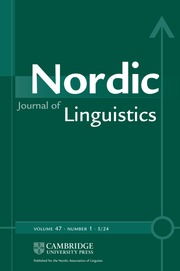Article contents
Temporal adverbs in Icelandic: adverbs of quantification vs. frequency adverbs
Published online by Cambridge University Press: 04 December 2007
Abstract
Temporal adverbs can usually be divided into groups. Amongst those are adverbs of quantification, such as often, sometimes and never, and frequency adverbs, such as constantly and regularly. This paper presents some new data that shows that the Icelandic temporal adverb alltaf ‘always’ can be both an adverb of quantification and a frequency adverb. When alltaf modifies a progressive construction its meaning shifts, depending on the aktionsart of the restrictor. When the restrictor is punctual, alltaf functions as an adverb of quantification and has a frequency meaning (X is always happening at the time Y takes place). When the restrictor is durative, alltaf does not quantify over the event, and instead gets a durative meaning, similar to that of stöðugt ‘constantly’ (X happens constantly during the time Y takes place).
Information
- Type
- Research Article
- Information
- Copyright
- 2007 Cambridge University Press
- 6
- Cited by

